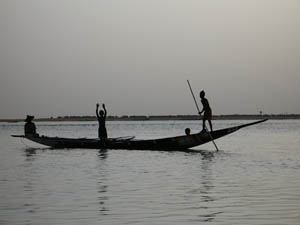Nigeria’s muddle is more like the muddle we all face in Compression than the oil spill in the Gulf. Nigeria sits on a lot of oil, sweet crude preferred by American refineries. About 40% of Nigerian oil exports go to the the U.S., and it accounts for about 10% of all American oil imports.
A few media reported last week that the Gulf blowout is not the biggest oil spill in the world. That’s in Nigeria, but comparisons skew because Nigerian spillage accumulated over time from many, many sources. Causes are disputed, but they don’t absorb us like the technical adventure in mile-deep water in the Gulf. Locals blame oil company incompetence. Oil companies blame oil poachers who tap wells and pipelines for resale on black markets, a practice called bunkering. (The Dunning-Kruger effect thrives here.)
The Nigerian government shares blame as a “co-conspirator.” It’s invested about 55% in Western oil ventures. Regulation mostly consists of requests that operations conform to international standards. And like many other things in Nigeria, numbers obfuscate the government’s use of its oil royalties, but too little of it has gone to develop people.
Nigeria is the most populous nation in Africa; 135 million very diverse people beset by problems, just one of which is tribal and religious conflict, which many insist is merely a cover for land and resource battles. Bunkering artists and violence by rebels against various injustices have at times trimmed oil production by up to 25%.
GNP per capita has risen recently, but it’s not much above Haiti. Maybe half of all children attend school. Nigeria is “thought” to have the lowest engineer per capita ratio of any third world country, so developing skilled people is problematic.
Between 1991 and 2009, Nigerian life expectancy dropped from 53 to 47. One of many reasons is poor practice disposing of medical waste. For instance, hypodermic needles are reused after questionable sterilization methods. Poor Nigerians are a market for used electronic gear, so they pitch a lot of electronic detritus with hazardous materials around the Nigerian landscape. A knowledgeable Nigerian has reason not to wax enthusiastic about economic growth.
Chronic problems in Nigeria seldom make world news. A dramatic blowout off the Louisiana coast does. In Compression, the Nigerian muddle better resembles that faced by all societies, but Nigeria’s muddle is so concentrated that it’s easier to see a total picture.
So suppose you wanted to establish an excellent, environmentally responsible operation in Nigeria. How would you go about it?
Figure that out and maybe we can become much more competent dealing with Compression everywhere. Or just reflect on what would happen to your business model today if energy costs went up by 4X (to about $10 a gallon gasoline).

